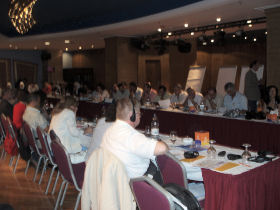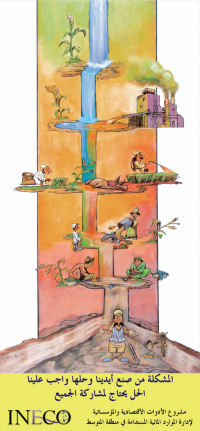|
In this issue:
The Cyprus INECO and Nostrum-DSS Joint Event:
IWRM through coordination, dissemination and
exploitation of research outcomes
Egypt: Meeting local residents in Basandeila
Syria: Discussing with authorities on the pollution of the
Barada River
Lebanon:
Unveiling conflicts & perceptions on water stress in the
Damour River Basin
Cyprus: Citizen proposals for the protection of the Pegeia Aquifer
The 2nd semester Deliverables of INECO
Future project events
The INECO Consortium |
|
The INECO Syria Stakeholder Workshop
Discussing with authorities on the pollution of the Barada River
|
|
Background - The pollution of the Barada River
|
|
The Barada River Basin is located in the
southwest part of Syria. The river ecosystem is subject to increased
pressures, resulting from the the rapid and uncontrolled urbanization and industrial development,
as this is the area where the capital, Damascus, is located.
Historically, the Barada River was a
vital environmental and socio-economic resource, sustaining the oasis of
Ghouta, which contributed to the local economy and constituted a rich
ecosystem, also considered a cultural heritage. However, in recent
years, the Barada River ecosystems have collapsed, due to the high loads of
industrial and domestic waste and wastewater discharge, which exceed the
river’s self purification capacity, and the reduction of river flow, resulting
from rainfall decrease and use of the Feige Spring for drinking water
supply.
|
At present, the efforts undertaken
in order to address the problem are incomplete, as
the applicable environmental law is not strict enough, and due to
legislative limitations and lack of environmental
awareness. Most industries discharge contaminants to the
sewerage system or simply to land and rivers without
treatment, free of charge and without penalties being
enforced. In addition, the spatial dispersion of micro- and
small-scale industries hinders the effective control over
discharges. The current agricultural practices, which
include excessive application of fertilizers and pesticides,
overexploitation of water resources and application of
inefficient irrigation methods have also contributed to the
exacerbation of water pollution in the area.
|
|
 Disposed solid waste, industrial wastewater and reduced river flow in the
Barada River
Disposed solid waste, industrial wastewater and reduced river flow in the
Barada River |

The Barada Spring Lake in February 2008 |
|
|
|
The INECO Workshop titled "Building a common vision
for mitigating water pollution in the Barada River Basin" was held in
Damascus, on September 10th 2007. The event gathered 54
participants, including representatives of public authorities and ministries
dealing with various issues related to water pollution abatement, and
NGOs and water users' associations.
The 1st session (Introduction)
included:
-
The welcoming address of Dr. Jamil Falloh, Water Resources Manager in
the Greater Damascus area, and representative of the Ministry of
Irrigation. Dr Falloh elaborated on water pollution issues in the Barada
River Basin, explaining that wastewater discharged without prior
treatment imposes great health and environmental concerns. He pointed
out that the Government is undertaking new projects, and has embarked on
a large investment programme, for the construction of new wastewater
treatment plants.
-
Prof. Dionysis Assimacopoulos (INECO Project Coordinator) summarized the concepts and premises of INECO by
presenting the broader context and challenges for water management in
the MENA Region, and the specific purposes and methodology of INECO. He
explained the purposes of the workshop, and the opportunities that it
can offer to both the project but most importantly to the local
stakeholders who are participating in this effort.

The 2nd session aimed at
stimulating the discussion among stakeholders, by setting
the frame for the discussion:
-
Eng. Malek Haddad, from Studies and Integration
Consulting, the INECO Regional Partner in Syria, pointed
out that respect towards the environment is a
responsibility shared among individuals,
communities, organizations and the Government. He
specifically stressed that the role of policy makers is
to establish and implement a practical and applicable
framework for integrating the management of water
resources in the national context, taking into account
the experience and best practices already applied in
other countries. He then presented an overview of the
current institutional and economic setting for water
quality management in Syria, and made an introduction to
the water management issue that was the theme of the
workshop, i.e. “Water Pollution from household,
industrial and agricultural drainage water in the Barada
River Basin". Eng. Haddad showed many photos from the
Barada River, from its source to the Otayba Lake. The photos
demonstrated many
pollution sources along the riverbed. Furthermore, he
pointed out the increased urbanization of the greater
Damascus Area during the last 40 years, demonstrating
satellite photos.
|
-
Ms. Eleni Manoli (Chemical Engineer,
National Technical University of Athens), presented the
concepts for Integrated Water Resources Management, and
instruments and approaches for preventing and
controlling water pollution. During this presentation,
workshop participants were asked to write down their
perceptions on the causes and effects of pollution and
water quality deterioration of the Barada River.

The 3rd Session was devoted to
discussion among all participants, who expressed their
perceptions on the problem. The main
issues raised were that:
-
The application of the law for
both private and public sector establishments is a
very crucial issue. The Environmental Law is still
not fully applied because there are many
implementation difficulties for public
establishments due to the lack of political will.
-
It is very important to
harmonize and integrate the different sectoral
policies.
-
The implementation of any
economic instrument should be based on a
participatory approach, involving all the
responsible bodies in order to identify and agree
upon solutions.
-
It is necessary to rethink the
overall concept of water policies, especially with
regard to food security, water security and costs
for water exploitation.
-
Solutions to problems are
already known. What is needed are decisions, and
their application should originate from
decision-makers at the high political levels, and
not from experts. All ministries should be involved,
in order to create a very specific, targeted and
clear water policy, which should then be presented to the
high-level decision makers for implementation.
The media coverage of the event, which included interviews
for the National Television and local radio and
announcements at the local newspapers, contributed to
enhancing awareness among the general public on the
importance of the analysed issue and the effort undertaken
by INECO.
More information on the
Syria workshop
|
|
|
|
The local stakeholder survey, undertaken within the
framework of the INECO Syria Workshop, aimed at arriving to a set of
possible options for addressing the pollution of the Barada river.
In total, 46 workshop participants
responded to the survey, which comprised 15 questions. The most significant results obtained from the survey
were the following:
-
Although water shortage is considered the primary
water management problem (~70% of replies), water
pollution is also considered significant (~48% of replies).
-
The majority of participants (87%) believed that
the pollution of the Barada River is a very important issue, that needs
to be addressed immediately. Increased health risks are considered the
most significant effect, linked also to the pollution of
groundwater bodies.
-
The following are considered the main causes of river pollution: a) inadequate domestic wastewater collection and
treatment (41%), and b) discharge of industrial effluents without prior
treatment (33%).
|
Four main instruments were
discussed for mitigating industrial pollution and were
ranked by workshop participants using a scale ranging from 1
(least effective) to 5 (most effective). Ranking results are
presented in the Figure below.

Outcomes of the Syria Stakeholder Survey - Ranking of
options for reducing
industrial pollution
(Click here for an enlarged version)
More results from the Syria
workshop survey |
 |
|
 Disposed solid waste, industrial wastewater and reduced river flow in the
Barada River
Disposed solid waste, industrial wastewater and reduced river flow in the
Barada River

